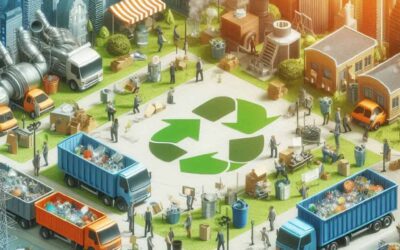The Second Recycling Revolution – Part 2
By Guest Authors Neil Seldman, The Recycling Cornucopia Project, Zero Waste USA and
Susan Kinsella, Conservatree and The Recycling Archives
Distributive composting businesses and municipal programs have become the fastest growing component of recycling with the proliferation of backyard and community composting, curbside collection of organics, and aerobic digestion facilities for clean, source separated organics. Once again, community projects led to municipal programs across the country.
New rules by local and state governments reinforced private investments. State recycling market development agencies were created and existing ones re-invigorated. New programs such as NextCycle in Colorado and Michigan complemented older programs such as California’s Recycling Market Development Zone program and Resource Recovery Parks in Austin, TX and Alachua County, FL. Policy decisions reinforced private investment in infrastructure, training and business expansion – choices such as Right to Repair, mandatory composting, minimum recycled content, waste surcharges, ban on single use plastic, bans on bags and polystyrene products, universal landfill bans, as well as expanded and new container deposit legislation.
Still more legislation is on the horizon, including packaging taxes (CA), advanced plastic disposal charges (TX) and diverse forms of Extended Producer Responsibility. The flood of new rules surpasses those introduced in prior decades.
At the federal level, a national waste surcharge, or Producer Responsibility fee, a tax on virgin plastic (REDUCE ACT), and a moratorium on virgin plastic production are wending their way through Congress. Local bans on single use take-out ware have opened the way for innovative new enterprises providing restaurants and customers with reusable, washable containers and tableware. Unit Pricing or Pay As You Throw programs operate in thousands of U.S. cities and towns. By introducing this incentive to recycle and disincentive to waste, communities increased their recycling rate by up to 40% in one year.
In the wake of the China ban, cities and towns have reverted back to dual stream collection to escape the high tip fees at single stream processing facilities. Dual stream collection systems benefit from households doing the first separation of materials rather than relying on costly technology. In New Jersey, dual stream processing costs $80 per ton compared to the $120 per ton for single stream processing, a one-third savings equivalent to millions of dollars annually for local government and businesses.
Building deconstruction has blossomed as well. Beginning in 2000 with deconstruction of military barracks and then broader programs supported by the U.S. Department of Health and Human Service’s Office of Community Services, a growing deconstruction movement now boasts a trade association, the Building Materials Reuse Association (BMRA), and a record of remarkable accomplishments. A pending mandatory deconstruction bill in Baltimore would double the number of workers at Second Chance.[1]
Finally, Zero Waste has captured the hearts and minds of Americans. In the early 1970’s when asked about recycling by the EPA, they answered ‘more.’ Today the answer is Zero Waste. Specifically, 90% reduction of the waste stream, no burning, organics out of landfills, and no toxics.
“Zero Waste, Or Darn Close To It!” is the new mantra complementing the Reduce, Reuse, Recycle mantra from the previous decades. To these ends, local governments have passed over 150 new rules and ordinances to pave the way for Zero Waste.[2]
Yet . . . this new wave of recycling activity is still met with resistance at multiple levels.
Headwinds from Big Waste, Big Soda and Big Packaging
Recycling’s trajectory is unstoppable, and yet it is not inevitable.
Single stream processing made an immediate impact. In 1995, only five cities had adopted single stream. By 2003, that number jumped to 93. Between 2005 and 2014, use of single stream systems grew from 29 percent of American communities to 80 percent.
Contrary to single stream’s promotional promises, the national U.S. recycling rate stagnated at 35% from 2005-2017, and then fell after the China National Sword ban led to 150 cities and counties canceling their recycling programs.
The heirs of WMI and BFI (WM, Republic, GFL, etc.) accelerated the pace of mergers and acquisitions, as reported in the trade press.[3] One CEO of an independent waste and recycling company says the consolidation has led to prices paid for solid waste and recycling services running 33% higher than costs should be in a competitive market.
Monopoly power in the industry continues to frustrate expanded efforts to cut waste. National waste companies try to repeal existing state bans on yard debris from landfills and oppose new ones, despite the ease of mulching and composting these materials.
“Big Soda” monopolies (e.g., Coca-Cola, Pepsi and others) actively oppose and try to repeal container legislation, despite its proven effectiveness in getting clean materials to manufacturers. But certain circumstances rate a different approach. Recently, Big Soda supported container legislation that gives them control over the system and the unredeemed deposits worth hundreds of millions of dollars annually. And in Connecticut, Big Soda snuck in an amendment at the midnight hour to give them control over the state’s system.
In Oregon, with the state having privatized its bottle bill, activists representing bottle and can recyclers are pushing for a more inclusive structure to allow workers to prosper in this growing sector, with better equipment and cooperative companies.[4]
Preemption of local decision-making is a key corporate strategy. In California as well as other states, packaging interests pressured the state to pass a bill preventing local authorities from adopting “radical” packaging regulations (e.g., source reduction, refillables, minimum content, bans, and waste surcharges). In Colorado and Kansas, citizens forced a repeal of such a law.
Extended Producer Responsibility is the ultimate pre-emption legislation. To many recycling and Zero Waste activists, the demands by Big Packaging (e.g., Unilever, Procter & Gamble, and others) that its EPR goals and objectives have the “force of law” is a “hostile takeover” of a robust recycling industry (thousands of companies, millions of workers, and gross sales of over $350 billion) by a parasitic bureaucracy that hoards money, has minimal government oversight, and overwhelms public servants with the lobbying and flow of money within the system.The British Columbia model was held up as THE model for the US. Oregon’s EPR bill approaches this model with some restrictions on corporate actions. The Maine EPR bill states its policy of no Producer Responsibility Organization (PRO) control, but the rules, which will take years to evolve, can still allow PROs to operate.
Thanks to aggressive research, reporting and activism, this EPR model is no longer so popular. Independent economic analyses by York University, Zero Waste Canada, and the British Columbia Bottle Depot and Recycling Association laid bare the false claims from British Colombia (BC). In fact, recycling has stagnated in BC for the length of time EPR has been implemented there, and costs have risen. Further, the PRO system tries to undermine the successful bottle bill system in the Province.[5]
[1] Treasure in the Walls: Reclaiming Value Through Materials Reuse in San Antonio,” 2021 [2] Managing and Transforming Waste Streams: A Tool for Communities, US EPA, 2020 Waste Monopoly, ILSR, 2021 [3] Landfills, Legislation and Longevity: How Industry Consolidation Fueled the Modern-Waste Sector, Lauren Rathmell, Waste Today, April 2022 [4] Case Study of OR Bottle Bill, Taylor, Cass, Talbot 2022,In New York and Oregon, Canning Reduces Waste and Changes Lives, ILSR, 2022 [5] York University's Studies of Extended Producer Responsibility Reveal Evidence of Failures, ILSR, 2021 The article originally appeared in the National Recycling Coalition Newsletter December 2022. https://nrcrecycles.org/




